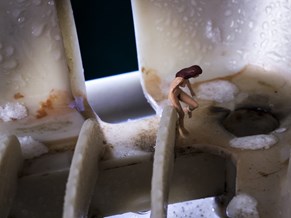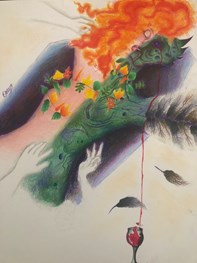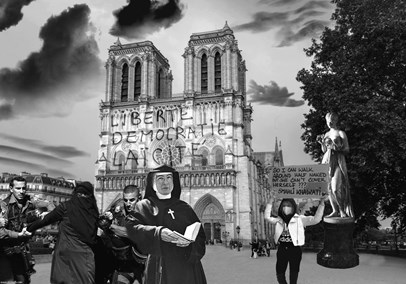Welcome to the University of Southern Indiana's 13th Interdisciplinary Colloquium!
Our relationship to filth is long, deep, and meandering. Unsanitary environments have contributed to epidemics such as the Bubonic Plague, and have similarly exacerbated misery in the sprawl of urbanization. Filth can function as a metaphorical damnation or critique: as Saint Augustine would suggest, we are baptized in filth from the moment we are born. This sentiment not only taints humans as unclean sinners from infancy, but evokes the long, troubling equation between female sexuality, motherhood, and uncleanliness.
However, our rapport to that which is proclaimed as filthy is not always detrimental to our physical or spiritual wellbeing. Though terms such as "filth" and "foulness" may carry overriding negative connotations, a compelling subset of cases equally suggest that the things which disgust us are not necessarily bad. When one considers the numerous books that have been banned or deemed immoral due to the metaphorical filth they contain, it becomes clear that their dirtiness is frequently symptomatic of innovation and the ability to push boundaries.
Whether symbolic or actualized, filth and foulness evidence complex and often fraught relationships within the world and ourselves. This colloquium aims to examine the myriad positive and negative connotations of filth, and how humanity can both thrive and suffer from these dynamic relationships.
We will be using Zoom for our 3 round table events, all of which are at 4 p.m. and use the same link:
Zoom Webinar ID: 928 24343 731
Presented by Susan Sauls, Director of University Art Collections |
Presented by Dr. Todd Schroer, Associate Professor of Sociology and Criminal Justice Using primary documents gathered over the last three decades this presentation focuses on Holocaust denial and distortion. Denial and distortion are found worldwide, and their ideas are perpetuated by individuals, groups, and nations for a variety of reasons. This presentation begins by covering the differences between Holocaust denial and Holocaust distortion, before turning to an overview of their history, the major arguments made, and what reasons motivate people to spread these filthy lies. It ends with a discussion of the claims and their perpetuation of, and reliance on, antisemitism, and the dangers these arguments pose within societies. |
|
It's Not Pretty: Activist Art Presented by Dr. Wendy Turner, Associate Professor of Social Work
|
|
Presented by Dr. Steven Williams, Associate Professor of Sociology
|
Filth, Foulness and Fornication in Folk Song
Presented by Tom Drury, Instructor in Music

Little Women by Andrea Hoelscher, Photography Instructor
In the photographic series Little Women I staged scenes populated by tiny female figurines. These figures explore and travel through mysterious surroundings. Architects and city planners use figurines like these when envisioning new, idealized spaces. My arrangements are designed to provoke a different and less utopian range of associations. How did these women find themselves in the midst of all this filth and foulness?
|
In the Medieval Locker Room: Double Entendre in a Fourteenth-Century Courtly Love Poem Presented by David O'Neil, Assistant Professor of English |
Presented by Dr. Stella Ress, Assistant Professor of History. |
|
Untitled (Portrait of Ross in L.A.) by Felix Gonzalez-Torres |
LEFTOVERS - TRASHY or CLASSY? The Role of Excess, Waste, and Filth in Contemporary Art by Sarah Christensen Blair, Professor of Art and Design For some, the idea of leftovers brings comfort and warmth whereas for others, additional work, anxiety, or bother. In our homes, leftovers often find themselves in our recycling and trash bins. Rangingfrom leftover food, product remnants, or traces of life outside the domestic boundary of our threshold such as dirt or leaves, the evidence of lives lived can be measured in what we leave behind. This paper/presentation explores the use of leftovers – refuse, excess, filth – as an art medium to that can ignite social change, comfort those who encounter the work, or simply question the role of specific materials in our daily lives. Read the full paper here. |
|
Presented by Dr. Jason Hardgrave, Associate Professor of History |
Presented by Rob Millard-Mendez, Professor of Art |
Presented by Dr. Monica O'Neil, Adjunct in World Languages & Cultures |
|
Political Waste
by Anna Ardelean, Political Science major |
Joan of Arc
by Jackson Cieslack, French and Biology major |
I Don't Give a Shit
by Elise Carter-Keith, English major
"My parents separated from each other before I was born. Growing up was always a constant back and forth between households. On my mother’s side, I have four younger half siblings, and on my father’s side, I have two younger half siblings. I was the only one going back and forth between parents and households, and although I do not remember much from my earliest childhood, I did notice some differences growing up." Read more...


Leave Comments or Questions
If you have a question or a comment about one of the presentations in the Colloquium, leave your name and mention the presentation title and author in your comment below.